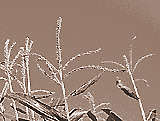
A R C H I V E S
Thanks
for
visiting.
2004
Entered in the
Madison County
Silver Arts Contest

![]()
Long Lane, Deep River
A Poem By Robert Dixon
I walked the long lane when I was only four
with warm dust between my toes.
A scarred black lunch box pulled me on,
but when the winding track turned towards the road
I gave it up and went off through the woods.
The green grass there, trimmed by sheep,
was soft upon the naked sole
until a stray mongrel threatened me, but retreated from MY dog,
a cross between a dachshund and a pointer. (Don't ask me how.)
From planting in the field my father saw me coming,
and smoothed a patch of soil where we sat and shared his lunch:
man, dog and boy.
With arms burned brown by many summers' suns he lifted me,
(a son born much too late in life for him to see me peak)
then placed me on the tractor seat.
From that coveted place I viewed the straight rows he was planting,
already knowing what pride he placed in this,
judging other men by how close they came to imitating his.
The man, bent and lined by the great depression,
took time between the crooked lane and never-deviating rows,
time, still alive when he was gone and the lane forgotten,
by all but the boy.
I waded the deep river when I was just a teen
with tennis shoes upon my feet.
A hand-me-down rod led me on,
and when the current swirled around the rocks
I planted feet and let the bait drift down.
The rushing water, fed by recent rains, was chill around my loins,
the antithesis of what would soon be stirring there,
and then the ancient catfish came to test my manhood first.
From fishing of his own, my older brother saw us fighting there,
came up behind me, grabbed my belt,
did nothing more.
With nerves grown cool from flying in the South Pacific skies
he held me, too young to be his equal, too old to be his son,
too innocent to refrain from being both.
When I had fought the fight and won,
I followed his code and cut the line.
This fish was too old to eat, and he did not kill for trophy.
After he was gone, I read a letter he had written to his son.
He too had carried that lunchbox the same as I had done
and seen those same straight rows.
Horses not a tractor plowed his field,
and that was all that separated us.